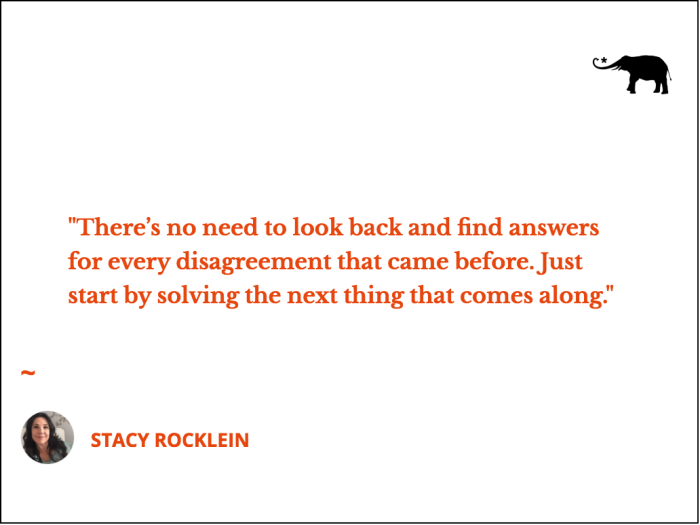Arguments sometimes take on a life of their own, don’t they?
A small thing happens (example: one partner spends money without consulting the other one) and it triggers a snowball of all the times it’s happened in the past, and that results in a big feeling of being totally incompatible when it comes to all things money.
Let’s take a breath. Even if that last dramatic statement has some truth to it, it’s unsolvable from that perspective. It’s too enormous. It’s completely overwhelming.
We have to start by solving the little things.
Get granular about it and find some resolution and agreement on the small thing that happened. That starts a different kind of snowball.
One small solution gives two people confidence, which builds relationship esteem. Hey, look, we can figure stuff out together. When you string together a bunch of those successes, a new pattern emerges. Instead of shining a spotlight on total incompatibility, it highlights the ability to find solutions, compromise on differences, and talk through hard things as partners.
Little conversation by little conversation helps solve the bigger issue. Like that saying about eating an elephant; you have to do it one bite at a time. There’s no need to look back and find answers for every disagreement that came before. Just start by solving the next thing that comes along.
Let’s break it down one step at a time:
1. Agree on the small thing to solve.
When we solve small, we also keep ourselves out of dangerous territory. Things like you always spend money we don’t have or you’re such a miser just complicate an already contentious situation. Ignore the big picture for now and zoom in real close on this one thing.
2. Get clear on what solving looks like.
Focus on the problem like sitting side by side on a couch working on a challenge together. First, it’s important to know what type of solution would satisfy each partner. In the example above, the person may not necessarily want their partner to stop spending money, but they do want to feel part of the decision-making process. We won’t truly know until we ask.
3. Gently keep each other on topic.
Please note the word gently. It’s normal to get in the weeds if you haven’t focused on solving small before. If someone starts to veer into always and never wording or one partner tries to sneak in similar past issues, carefully bring each other back to the small thing you’re trying to solve. It’s helpful to put a pin in the other things coming up and promise to have a future conversation about them. Just don’t do it all right then.
4. When agreement is reached, be clear on actions that need to be taken.
Humans hear what they want to hear. We’re also really great at revising things in our own minds. It’s critical to make sure we’re on the same page about the solution. What are we agreeing to? Is it obvious to both partners? One person’s silence may indicate they don’t intend to do what’s being suggested but also don’t want to say no directly. It’s best to get crystal clear about agreements.
5. Follow up with what worked and what didn’t.
If you solved one small incident, give yourselves a big congratulations. It’s important to reinforce successes, so make sure to celebrate what went well but also take the opportunity to learn from what went wrong. Failures can tell us a lot about communication too. When we’re trying to solve big by focusing on the small things, there’s a high likelihood we’ll get another shot at the issue in the future.
Just like self-esteem, relationship-esteem develops one micro success and acknowledgment at a time.
~












Read 2 comments and reply